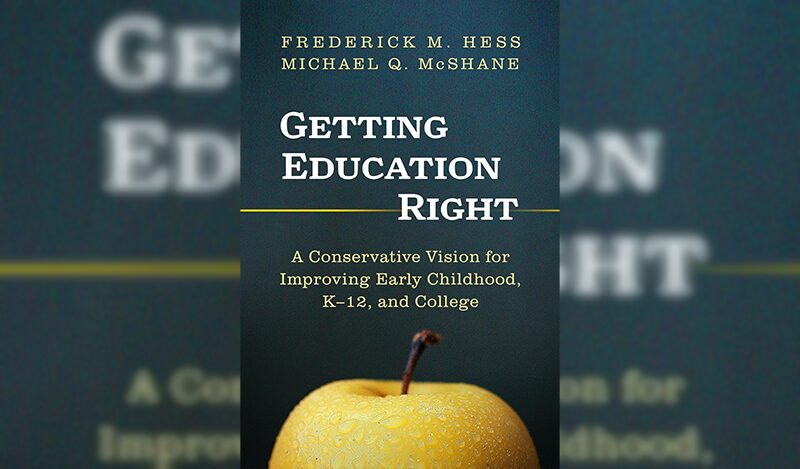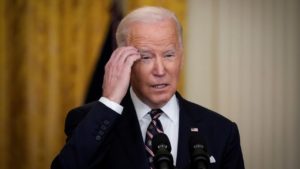Book review: A conservative vision for the future of public education
In an education landscape long dominated by Democrats and liberal policies, what do conservatives have to offer?
A lot, according to Frederick Hess and Michael McShane.
In their new book,…

In an education landscape long dominated by Democrats and liberal policies, what do conservatives have to offer?
A lot, according to Frederick Hess and Michael McShane.
In their new book, Getting Education Right: A Conservative Vision for Improving Early Childhood, K-12 and College, Hess and McShane present a thoughtful and thorough roadmap for conservative education reform.
“We’ve long found conservatives to be much clearer about what we’re against than what we’re for when it comes to education,” they write. “That’s a problem.”
Eschewing extremist labels and false dichotomies, their proposed principles and policies can appeal to both left-of-center and right-of-center voters as pro-parent, pro-teacher and pro-student.
Hess is director of education policy studies at the American Enterprise Institute and the founder and chair of the Conservative Education Reform Network. McShane is Director of National Research at EdChoice.
Parents as partners
First and foremost, education is a cooperation between parents and educators.
“As schools professionalized in the 20th century, the education system increasingly drew a distinction between certified educators and parents – too often regarding parents as nuisances rather than partners,” Hess and McShane observe in the book.
That’s a problem, too.
No matter how many hours students spend at a desk, the involvement – or lack thereof – of their parents has an outsized impact on their education outcomes.
Getting Education Right includes an overview of American education spanning nearly a century, explaining how the current web of policies and bureaucracy came to be.
It also discusses how other social polices, such as paid parental leave, foster care, and even city planning, affect family life and, consequently, education.
‘Obliged to boo Shakespeare’
Second, Hess and McShane argue education should be “formative, not performative.”
They recalled one high school English teacher who said in Education Week, “When I read Romeo and Juliet with my students, I pause, give a thumbs-down, and say ‘Boo’ when the play says something misogynistic.”
“There’s something hubristic about a teacher who feels obliged to boo Shakespeare’s works because the language doesn’t conform to her social politics 400 years later,” the authors write. “Students read great literature to encounter moral dilemmas, heroes, and villains – education is about moral formation.
“It’d sure be nice if the teacher was more interested in helping students wrestle with formation and less in acting out her pet peeves.”
And if that example seems too politically charged to be universal, take a more humdrum one: the science of reading.
A 2022 TIME magazine article recounts the tale of Kareem Weaver, a teacher in Oakland, California who was frustrated with the structure-heavy, phonics-based reading curriculum.
So, Weaver and his colleagues advocated for whole-language instruction, which, Hess and McShane write, “matched their romantic notions of what they felt would be transformative rather than what reflected hard-earned experience about what actually helps students learn to read.”
To his credit, when Weaver realized the new way wasn’t working, he switched back to phonics.
Simply put, education exists to help turn small children into competent, responsible adults, not to give teachers a platform to live out their own personal agendas, the authors argue.
‘Choose what works’
Last, Hess and McShane advocate for an education system that embraces “confident pluralism.”
“Whether Montessori, classical, constructivist, vocational, STEM-focused, or what-have-you, there are many ways to organize and deliver education,” they write. “Our model should be a pluralistic one in which parents, educators, and students in varied contexts and circumstances are able to choose what works for them.”
Too often, politics pushes narratives of false dichotomies, the authors suggest. The school choice vs. public education debate is a prime example.
“We [conservatives] should offer a vision for educational pluralism that addresses needs, offers solutions, and respects the role of cherished local institutions,” they explain. “Remember that educators, too, often feel stymied by bureaucracy, administration, and petty politics. The emphasis should be on busting cartels, opening opportunities, and creating new options, rather than on dismantling well-liked institutions.”
Getting Education Right applies these core conservative principles to childcare, early education, K-12 and higher education.
So, if you’ve ever bewailed the education system for its countless problems, but don’t know what a thriving one looks like – start here.



